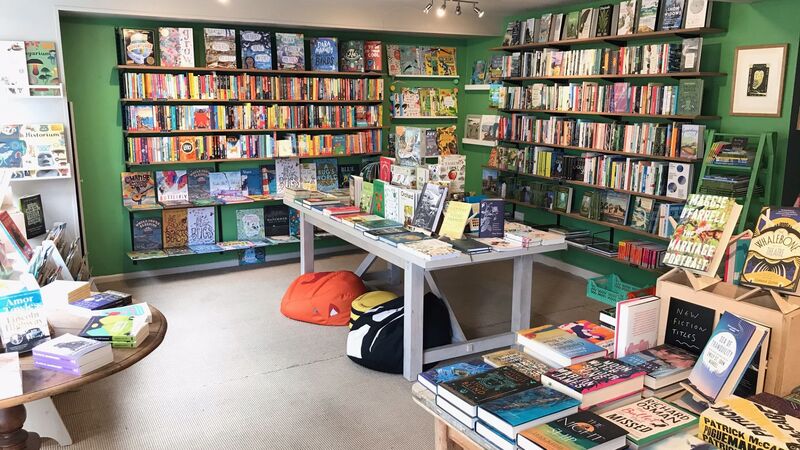You are viewing your 1 free article this month. Login to read more articles.
Publishing industry debates call to stop printing in China
The co-founder of publisher and bookstore Little Toller has called on the publishing industry to "clean up its production" and stop printing colour picture books in China, because of the environmental impact of printing far afield. However, some publishers have defended the choice to print abroad for capacity reasons, warning that the situation is "not black and white".
Gracie Cooper raised concern on Twitter that there was only one children's picture book in her shop printed in the UK, following publication of an open letter from children's authors and illustrators last week, asking publishers to commit to reduce their greenhouse emissions in line with the Paris Agreement. She said it was "not good enough" for publishers to offset their emissions, while still shipping most of their children's colour picture books from China.
"The carbon footprint of those boats in unbelievable," she told The Bookseller. "Publishers need to wake up. I think they’re so used to their own supply chain that they can’t or they don’t bother trying anything else. It’s easy for them to say they’re going carbon neutral and they’re offsetting all the time, but what is wrong in a post-Brexit world with publishers working with UK printers?"
Cooper said Little Toller is "really happy" with the UK printers it uses, and argues other publishers should make the switch. "Eight years ago we did a little bit of printing in India because at the time it was about cost and we were trying to keep our costs down as a really small publisher, but we soon ditched that. We always printed in the UK but now for the last five or six years we have 100% printed everything within the UK. If that means that the book has to be a little bit more expensive, then so be it. I don’t have a problem with that. It’s much better to work that way."
In her bookshop, the only children's picture book in stock printed in the UK is Isabella Tree's When We Went Wild, the first book published by Quarto's relaunched Ivy Kids imprint, which is "ultra-sustainable", printing books locally on 100% recycled paper.
"I don’t understand why others can’t do the same thing," said Cooper. She said the fact that many books on plastic pollution and nature are still printed abroad is "really bizarre messaging".
"I think a lot of the time it is price. All these kids books are so cheap. But I don’t really get it in 2021 that we should be printing all these books in China, or Latvia or Italy. They’re so wealthy these big publishers, surely they can be working with UK printers and investing with them for a future which is more sustainable," she said. With increased transport costs and freight issues with shipping coming out of China, switching to the UK printing could also have other benefits, Cooper argued.
"I think it’s definitely a conversation that is beginning to emerge and it’s happening more and more. We all care about where our food comes from, surely we should be caring about where our books are printed and how they are printed? It’s an important dialogue to be had," Cooper said.
"It’s really a call to arms to the industry as a whole to clean up its production of these books and think carefully about the decision it makes as we have massive targets being set to lower our global emissions". Referencing contact between printers and publishers at events such as The London Book Fair, she said: "People need to join the arguments and the conversation and work out ways they can work together."
Most publishers contacted by The Bookseller did not want to comment on whether they were rethinking their colour printing in China. However, Zoë Fawcett, production director at Bonnier Book UK, said the company was "continuously reviewing its supply chain". She told The Bookseller: “At Bonnier Books UK we print our children’s picture books all over the world, including here in the UK. As an active participant in the Science Based Target initiative, we are working to decrease our GHG emissions by a quarter by 2025 in line with the objectives of the Paris Agreement. As part of this commitment, we are continuously reviewing our supply chain and collaborating with our manufacturing partners internationally to reduce our climate impact."
A spokesperson for Penguin Random House said: “The decision on where we print our books is based on a number of factors including capacity, commercial considerations, and the printer’s labour and environmental standards - which we take extremely seriously. We have a sustainable sourcing policy for Penguin Random House UK which sets out the fair and robust labour and environmental standards we expect of all our suppliers, which are in line with globally recognised standards set out by ICTI. When we do print in higher risk markets like China, we audit printers before we engage them and also on an ongoing basis.”
Children's publisher and social enterprise Latana Publishing, based in Oxford, said it takes its carbon footprint "very seriously" and said the situation is "not black and white" when it comes to printing.
A spokesperson told The Bookseller: "Two years ago, we made the switch to printing only on FSC certified paper using soy-based, rather than petroleum-based, inks, and this year we've decided to eliminate plastic-heavy foiling and spot UV. Our decision to continue to print our colour picture books in China was made for reasons of cost but also, and importantly, because of the stronger environmental credentials of large, established printers in China versus smaller, newer printers in Europe.
"As an example, our primary printing partner in China publishes regular sustainability reports based on the Global Reporting Initiative (GRI) sustainability reporting standards, has conducted material and technological reforms to eliminate all hazardous waste, VOC, waste water and other pollutants, and has a robust action plan in place to move the plant towards carbon neutrality. We've found it almost impossible to get the same level of detail from smaller European printing plants where sustainability practices are nascent if in fact present at all, and where some aren't able to fulfil our requirements for soy-based inks.
"We're continually trying to find a balance between this and the longer sea miles printing in China necessitates. So while we see few barriers in moving towards 100% zero plastic packaging for our direct deliveries, for instance, the situation is not as black and white when it comes to printing."
The Bookseller is to publish a Climate Issue ahead of the 2021 United Nations Climate Change Conference (COP26), with the aim of interrogating what the trade can do to meet the challenge of environmental change in the wake of global warming.
The issue will be published on 15th October and will be co-edited by The Bookseller's comment editor Molly Flatt and associate editor Caroline Sanderson.



















